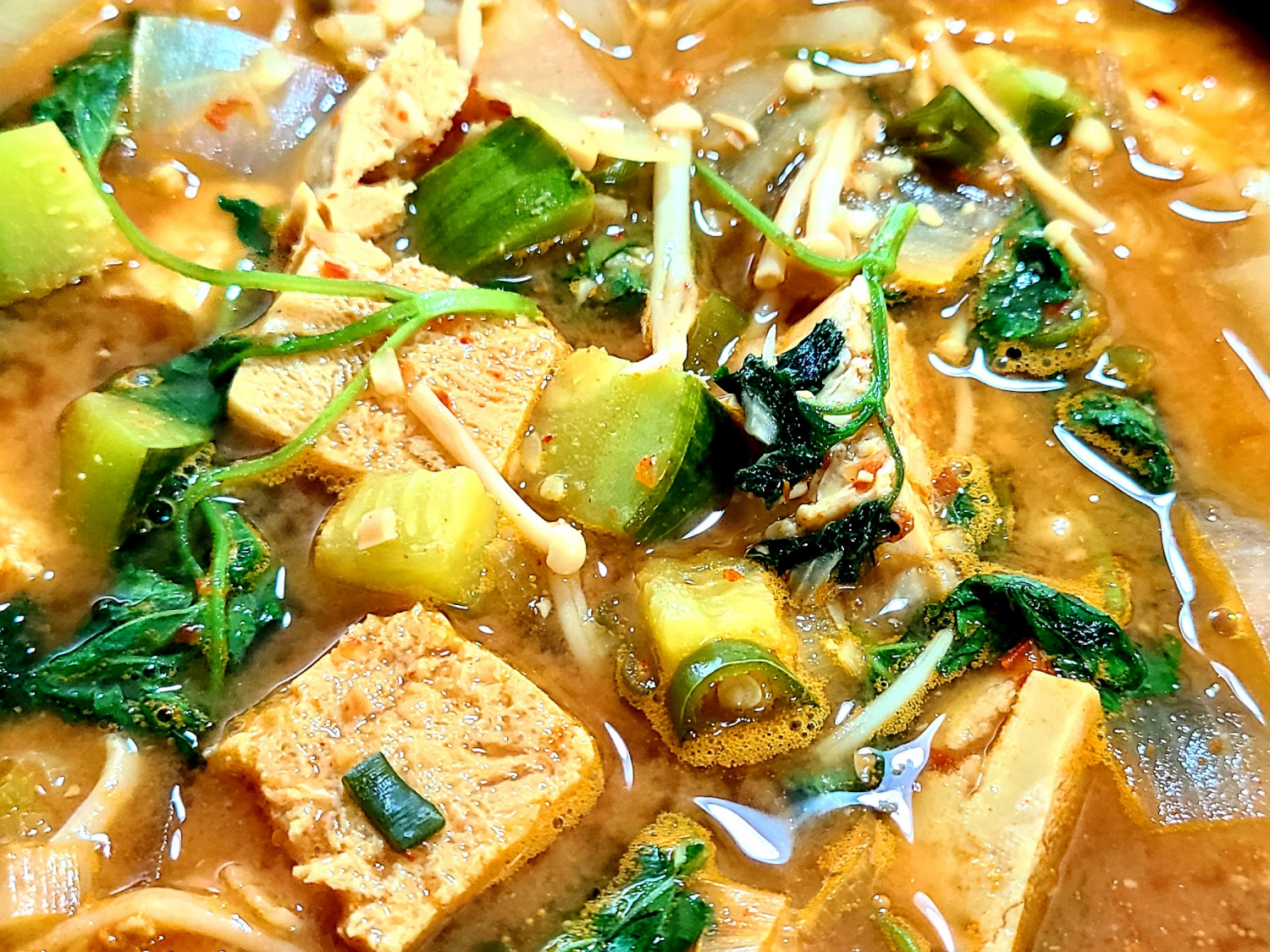Nutrient-Rich and Savory Doenjang Jjigae (Korean Soybean Paste Stew)
How to Make Delicious Doenjang Jjigae: Simply Changing the Order Doubles the Flavor and Nutrition!

Doenjang Jjigae, a staple of Korean home cooking! Typically, doenjang (soybean paste) is dissolved in broth first, and then vegetables and other ingredients are added. However, did you know that prolonged boiling can destroy beneficial compounds in doenjang or cheonggukjang (fermented soybean paste)? This recipe introduces a method that minimizes nutrient loss by boiling vegetables and other ingredients first, then adding the doenjang at the end. Let’s make a healthy and delicious doenjang jjigae for the whole family! (For more details, please refer to the YouTube video: https://youtu.be/8ycTgBnMeDI)
Key Ingredients for Doenjang Jjigae- 2-3 Tbsp Doenjang (Korean soybean paste – adjust according to saltiness of homemade or store-bought paste)
- 1 block Frozen Tofu (or fresh tofu)
- 1/2 stalk Green Onion
- 1/2 Small Onion
- 40g Radish (a small amount)
- 3 Korean Green Chili Peppers
- 1 Tbsp Gochugaru (Korean chili powder)
- 1/2 Zucchini
- 1 Tbsp Minced Garlic
- 1 bag Enoki Mushrooms
- 1 handful Perilla Leaves (optional, according to preference)
- 1 Tbsp Mirin (optional, helps remove fishiness from anchovy broth)
Cooking Instructions
Step 1
Feel free to adjust the quantities of the ingredients to suit your taste. Especially, perilla leaves have a distinctive flavor that not everyone enjoys, so you can omit them if you prefer. While frozen tofu can create a smoother and deeper flavor, fresh tofu works perfectly fine too.

Step 2
Chop all the vegetables and tofu into bite-sized pieces. If using perilla leaves, remove the tough stems and use only the soft leaves for a better texture.

Step 3
To create a clean and deep broth, add dried kelp (dashima) and anchovies to an earthenware pot (ttukbaegi), add water, and bring to a boil. Once boiling, reduce the heat to medium and simmer for at least 10 minutes to allow the flavors to infuse. Then, strain out the anchovies and kelp, leaving only the clear broth.

Step 4
Ladle about 3 cups of the prepared anchovy broth into a separate bowl and let it cool slightly. This is because if the broth is too hot, the savory aroma of the doenjang can dissipate. Add the doenjang to this lukewarm broth and dissolve it thoroughly. Since homemade doenjang can be saltier and store-bought doenjang varies by brand, be sure to taste and adjust the amount accordingly.

Step 5
It’s important to dissolve the doenjang smoothly with a spoon until there are no lumps. Pre-dissolving the doenjang this way prevents clumps in the stew and makes the broth smoother.

Step 6
If you’re concerned about any fishy taste from the anchovy broth, adding 1 Tbsp of mirin will effectively neutralize any unwanted odors, resulting in a cleaner-tasting doenjang jjigae. Add the radish and onion, along with the cubed tofu, to the prepared broth and bring it to a boil. Once the radish begins to turn translucent, it’s time to add the other vegetables.

Step 7
When the radish has softened slightly, add the chopped green onion, Korean green chili peppers, zucchini, and minced garlic. At this stage, also add 1 Tbsp of gochugaru for a touch of spiciness and vibrant color. Continue to simmer for a little longer to allow all the ingredients to meld together.

Step 8
Once all the vegetables and tofu are cooked and tender, it’s time for the final step. Pour the pre-dissolved doenjang broth into the earthenware pot and simmer briefly. It’s crucial not to over-boil after adding the doenjang. Think of this as the stage right before turning off the heat.

Step 9
Even after turning off the heat, the earthenware pot retains heat, allowing the stew to simmer gently. Utilize this residual heat to add the perilla leaves and stir lightly. Your delicious doenjang jjigae with its aromatic perilla flavor is now complete!

Step 10
By adding the doenjang at the end and simmering only briefly, you can minimize the loss of its beneficial nutrients due to heat. Enjoy your flavorful and healthy perilla doenjang jjigae!



